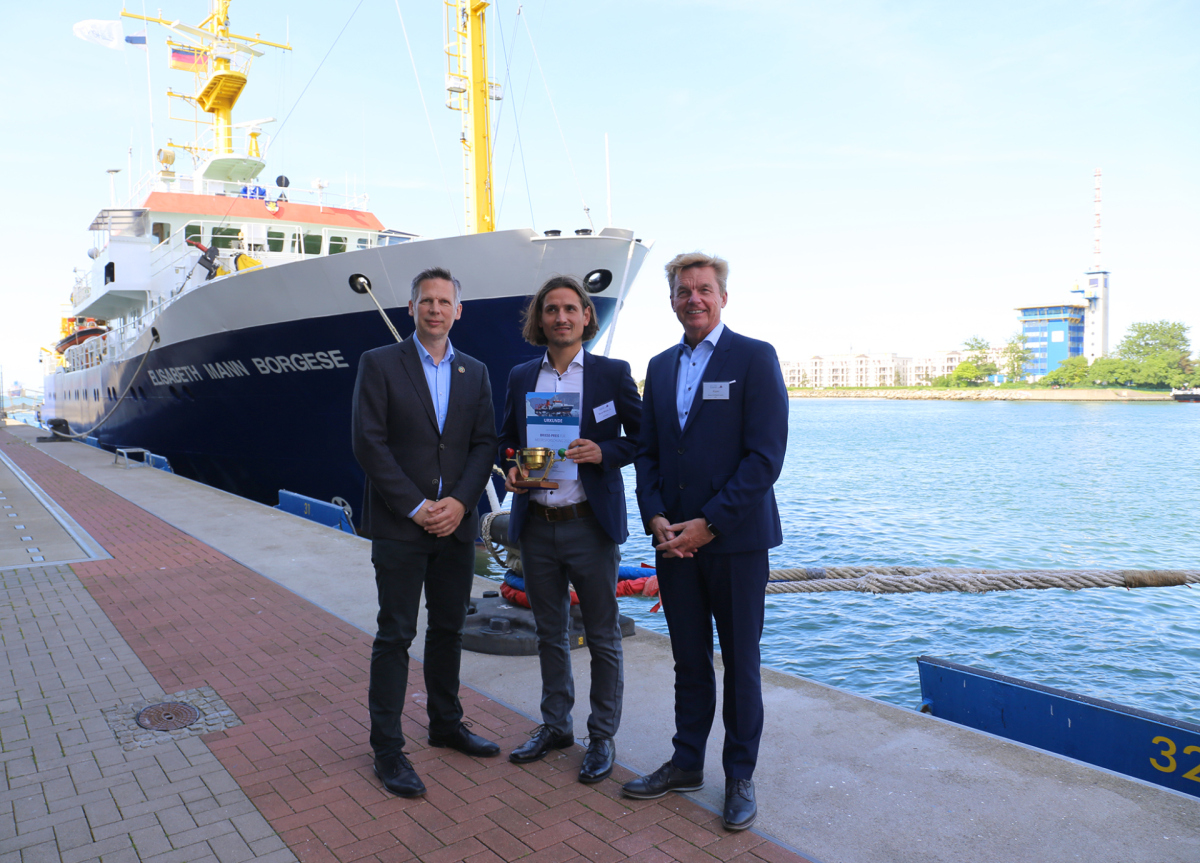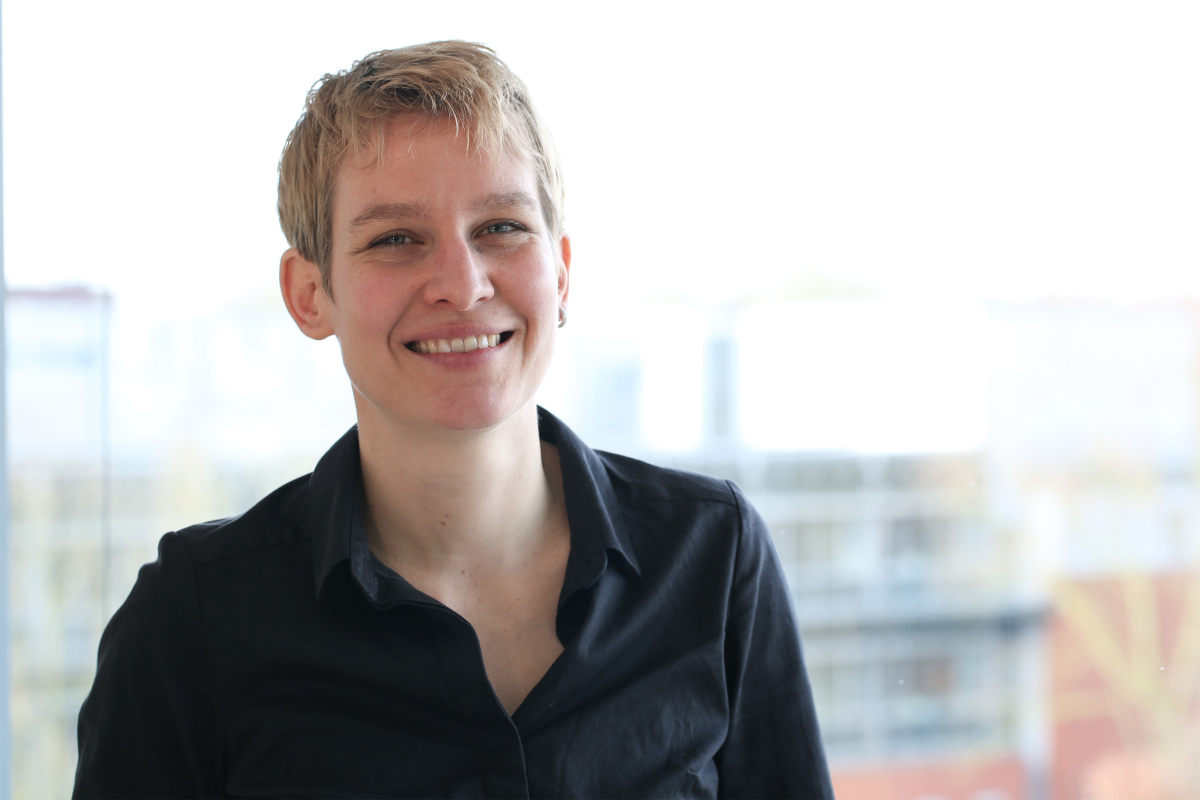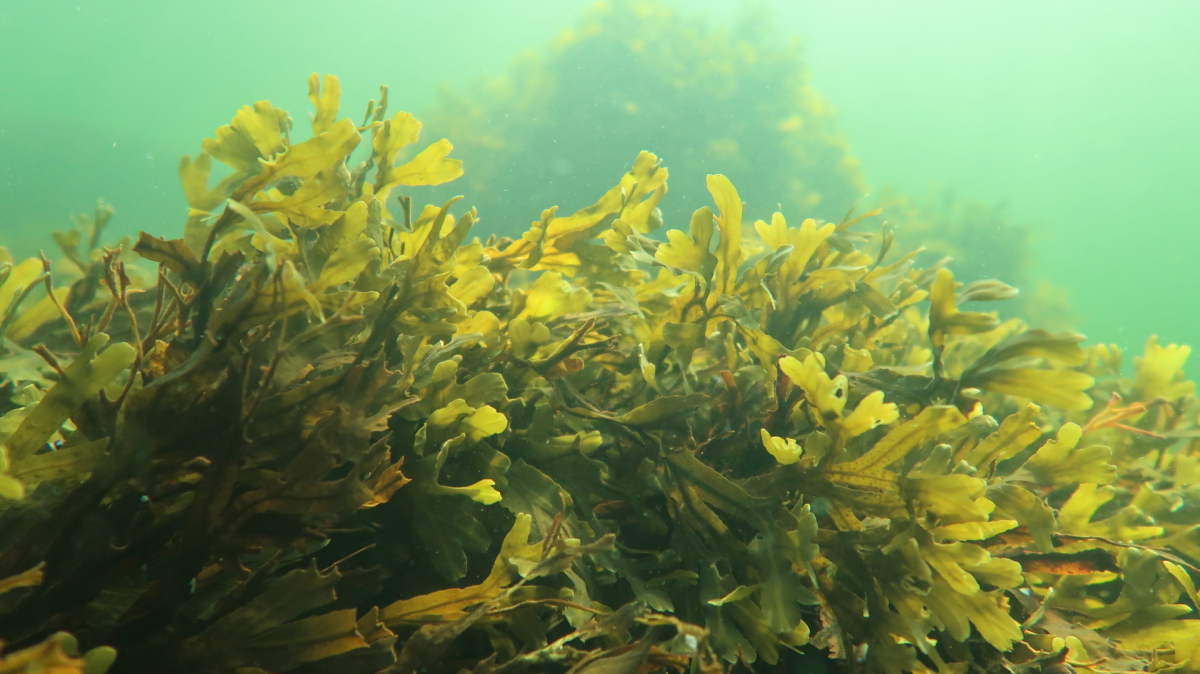- Press Office
- Press releases
- Hagen Buck-Wiese receives the BRIESE Prize for Marine Research 2023
Hagen Buck-Wiese receives the BRIESE Prize for Marine Research 2023

Today's BRIESE award ceremony took place in a special setting this time: Around 100 guests gathered on board the ice edge research vessel MARIA S. MERIAN, which is currently moored in Warnemünde harbour for a few days. In addition to the hosts from the BRIESE shipping company and the IOW, well-wishers also included the Federal Government's marine commissioner Sebastian Unger, MV Science Minister Bettina Martin and the well-known expedition leader and publicist Arved Fuchs. "Only very dedicated field and laboratory work, which included four ship expeditions lasting several weeks, has made possible the astonishing discoveries of Hagen Buck-Wiese, who has shown us the unexpected value that brown algae can have for us humans," says Klaus Küper, Head of the Research Shipping Department of the Briese shipping company, on the occasion of this year's presentation of the BRIESE Prize. "The outstanding work of this year's award winner shows once again how research into basic principles at sea can develop direct social relevance," says Küper.
Why brown algae mucus is good for the climate: the prize-winning doctoral topic
"Every year, algae fix 50 gigatonnes (Gt) of carbon in the ocean, most of it as carbon hydrates. Nevertheless, there was a lot of uncertainty about their fate and influence on carbon storage in the sea, not least due to a lack of methodology for extracting them from seawater for further analyses," says Hagen Buck-Wiese, winner of the 14th BRIESE Prize, describing the major knowledge gap that was the starting point for his doctoral thesis at the Max Planck Institute for Marine Microbiology in Bremen. Algae, both large and microscopic, use photosynthesis to convert carbon dioxide dissolved in seawater from the atmosphere into glucose for energy supply and into various, mostly complex multiple sugars for biomass formation.
for biomass formation. However, the identification and quantification of complex carbohydrates is particularly difficult in terms of methodology. "But only if you generate detailed information about the type and quantity of the different types of molecules in the marine environment can you uncover their origin and thus the path of the carbon stored in them - from the organism via the water to the sediment," says Buck-Wiese.
The marine biologist from Bremen has therefore been working on the development of a suitable method that can extract small polysaccharide molecules, so-called oligosaccharides, from seawater even at very low concentrations, as is usually the case with field samples. The successful application of the new method, in which samples from several thousand metres of water depth were also analysed, brought a surprise: in addition to large quantities of oligosaccharides near the surface, where they are expected due to the photosynthesis that takes place there, the small polysaccharides were also detected in very deep water. "Their presence in water masses up to 500 years after surface contact indicates that carbon remains bound here for many centuries without being released by bacteria. This oligosaccharide fraction alone stores around 1 Gt of carbon," emphasises Buck-Wiese.
On the other hand, Hagen Buck-Wiese wanted to know what happens to carbohydrates with a particularly complex structure. To this end, he carried out short and long-term incubation experiments with half a dozen species of brown algae from different regions of the earth, including the bladderwrack also known from the North and Baltic Seas and the free-floating gulf kelp of the genus Sargassum, which gives its name to the well-known Sargasso Sea in the western Atlantic. Here, too, he made an astonishing discovery: with the help of customised analysis methods, which he also developed himself, he discovered for the first time that brown algae secrete considerable quantities of a slimy sugar polymer into the sea every day. This so-called fu-coidan can make up to 50 per cent of the organic carbon measured in the surrounding water and undergoes practically no bacterial decomposition. "Brown algae produce this substance to protect themselves against harmful microbes. It is in the nature of things that brown algae mucilage does not taste good to microorganisms and we were therefore unable to detect any significant degradation in our experiments. The mucilage clumps together with suspended matter to form particles that sink to the seabed, so that fucoidan enters the sediment and stores carbon there for at least centuries, if not millennia," explains Buck-Wiese. Brown algae are exceptionally productive. If one extrapolates the results from Buck-Wiese's experiments and the subsequent global sampling specifically focused on fucoidan, it can be assumed that they bind up to 150 million tonnes (t) of carbon per year in the form of brown algae mucus, which is difficult to degrade, and thus remove around 550 million t of CO2 from the atmosphere. If one also considers the storage potential of the persistent oligosaccharides in the deep water of the oceans, which at the time of sampling was equivalent to around 4 Gt of CO2, the long-term carbon storage in the sea discovered by Hagen Buck-Wiese is enormous. By comparison, Germany's annual greenhouse gas emissions amount to 674 million tonnes of CO2 (estimate for 2023), according to the Federal Environment Agency. "Our research puts the spotlight on the considerable climate protection potential of complex carbohydrates formed in the sea. In particular, fucoidan sequestration by kelp forests as well as by natural and managed algae stocks represents an important ecosystem service for us humans, which should definitely be taken into account in nature conservation and renaturalisation measures," concludes the BRIESE Award winner.
The BRIESE Prize jury recognised Hagen Buck-Wiese's doctoral thesis as follows: "The dissertation, which was awarded 'summa cum laude', focuses on the different types of carbohydrates formed by algae, a group of substances that are among the most frequently produced types of molecules in the ocean. Until now, however, they have been largely neglected when analysing the marine carbon cycle, not least because the complex compounds were so difficult to determine analytically. Hagen Buck-Wiese has mastered the methodological challenges and thus opened a door that had previously been closed. The global significance of the long-lived carbohydrates produced by algae can now be systematically investigated and measures for utilising their climate protection potential can be derived from this."
Information on the 2023 BRIESE prizewinner:
Dr Hagen Buck-Wiese (born 1992) studied biology at the University of Bremen and specialised in marine biology at the Max Planck Institute for Marine Microbiology, also in Bremen, where he also completed his doctorate. (Original title of the doctoral thesis: Enzymatic diver-sification and brown algae as sources of complex glycans in the marine dissolved organic carbon reservoir, degree: 6/2023, grade: "Summa cum laude", supervision: Prof. Dr Jan-Hendrik Hehemann, University of Bremen, and Dr Manuel Liebeke, Max Planck Institute for Marine Microbiology). Buck-Wiese is currently a postdoctoral researcher at the University of Southern California, USA, in the field of marine and environmental biology.
The BRIESE Prize for Marine Research
The BRIESE Prize for Marine Research is sponsored by the shipping company Briese Schiffahrts GmbH & Co. KG, which is responsible for the management of medium-sized German research vessels such as the ELISABETH MANN BORGESE, as well as the larger research vessels METEOR, MARIA S. MERIAN and SONNE. The IOW scientifically supervises the awarding of the prize. Since 2010, the prize has been awarded annually to outstanding doctoral theses in marine research whose results are closely related to the use of research vessels and the use and development of technology and / or data collection at sea.
Original press release of the IOW
Gesamte Seitenbreite
Please direct your queries to:
Head of Press & Communications
MPI for Marine Microbiology
Celsiusstr. 1
D-28359 Bremen
Germany
|
Room: |
1345 |
|
Phone: |

